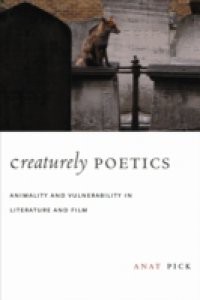Simone Weil once wrote that "the vulnerability of precious things is beautiful because vulnerability is a mark of existence." With these words, she established a relationship among vulnerability, beauty, and existence that transcends the boundaries separating the species. Her conception of a radical ethics and aesthetics could be characterized as a new "poetics of species," that forces us to rethink the significance of the body, both human and animal. Exploring the "logic of flesh," or how art and culture use the body to mark species identity, Anat Pick reimagines a poetics that begins with the vulnerability of bodies, not the omnipotence of thought.Offering a powerful alternative to more personalist visions of morality, Pick proposes a "creaturely" approach based on the shared embodiedness of humans and animals and a postsecular perspective on human-animal relations. She turns to literature, film, and other cultural texts that prioritize the inhuman and challenge the familiar inventory of the human (consciousness, language, morality, and dignity). She reintroduces Weil's crucially important work and its elaboration of themes such as witnessing, commemoration, and collective memory, and she moves away from assumptions about animal "otherness" and nonhuman subjectivities. Pick identifies the "animal" within all humans, emphasizing the corporeal and its issues of power and freedom. In her creaturely view, powerlessness is the point at which both aesthetic and ethical thinking must begin.

